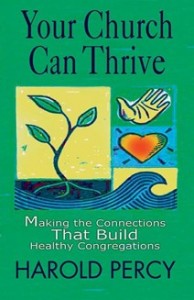
Percy helps congregations answer tough, critical, and strategic questions about their ministry and mission. How do we serve the member in the pew, the casual visitor, family and friends of the congregants, and the neighbourhood beyond? These are where connections that build healthy congregations are make and nurtured.
This book can be purchased at your local Christian bookseller or online here

 As a priest, I have had several conversations about The Da Vinci Code. None have been as memorable as the one I enjoyed, not as a priest, but as a rock climber and a friend. On a winter evening in 2004, between runs up the wall at the climbing gym, one of the guys asked if I’d read the popular bestseller. I admitted I had not, and after asking for his impressions, promised that I would read it and get back to him. That simple question, and an honest reponse, initiated a spiritual conversation as thrilling as the climbing itself.
As a priest, I have had several conversations about The Da Vinci Code. None have been as memorable as the one I enjoyed, not as a priest, but as a rock climber and a friend. On a winter evening in 2004, between runs up the wall at the climbing gym, one of the guys asked if I’d read the popular bestseller. I admitted I had not, and after asking for his impressions, promised that I would read it and get back to him. That simple question, and an honest reponse, initiated a spiritual conversation as thrilling as the climbing itself.
 • The Rev. Rob Hurkmans, in Port Colbourne ON, recently started up a monthly church service in the pub called Church on Tap—an informal service where people can sip a beer as they listen to a talk. You can read more about it here:
• The Rev. Rob Hurkmans, in Port Colbourne ON, recently started up a monthly church service in the pub called Church on Tap—an informal service where people can sip a beer as they listen to a talk. You can read more about it here:  The Vision of the Wycliffe College Institute of Evangelism is “every church an evangelizing community.”
The Vision of the Wycliffe College Institute of Evangelism is “every church an evangelizing community.”
 You’re thinking of inviting a friend to church? My first piece of advice: Don’t.
You’re thinking of inviting a friend to church? My first piece of advice: Don’t.